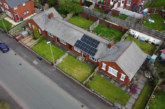 Around 2.5 million households in the UK — 10% of our housing stock — meet the criteria for fuel poverty. Shaun Hurworth from Glen Dimplex Heating & Ventilation looks at how modern electric heating appliances can do their bit to help tackle the issue.
Around 2.5 million households in the UK — 10% of our housing stock — meet the criteria for fuel poverty. Shaun Hurworth from Glen Dimplex Heating & Ventilation looks at how modern electric heating appliances can do their bit to help tackle the issue.
It is an alarming figure but 10% of homes in the UK are calculated as having above-median energy costs, which, if the occupants were to pay them, would leave the household income below the official poverty line. This either means people are cold, in debt to their energy supplier, or have very little money left for other bills, food and necessities. What’s worse, reports and data suggest that our efforts to address this are stalling, and more people are entering fuel poverty than leaving it.
There are many factors which can contribute to addressing fuel poverty, but one thing is clear; manufacturers, installers, energy companies and housing providers all have a part to play in reducing the impact that this has on millions of families in the UK. There is no single solution to fuel poverty of course, but one significant change that can be made in a fuel poor household is reducing the cost of hot water and space heating.
Insulation of the home to reduce heat loss is a vital first-step in this process, but once the energy requirement of the home has been reduced through improvements such as double glazing and cavity wall and loft insulation, the next big step is usually improving the heating and hot water system. This issue can be approached in two ways — and it is vital that installers understand the benefits of each for their customers.
Increase system efficiency
The first is increase system efficiency, which reduces overall energy use. By replacing a water cylinder or traditional storage heater, for example, with one that includes modern insulation, householders can save up to 27% on running costs. Dimplex’s Quantum off-peak electric heating system is an ideal example, offering a future-proof, energy efficient and proven upgrade for conventional storage heaters. Quantum was the first appliance to be categorised within SAP as a high heat retention storage heater, combining intelligent features with modern methods of insulation to offer controllable heat when it is needed, 24 hours a day.
Enhanced controls
The second way of approaching the issue of fuel poverty through heating and hot water systems is with increased control and automation. We have seen many instances where giving accurate control over a system has led to a reduction in running costs. With the right controls a resident can choose to only heat water or a room when it is needed, maintaining health and comfort whilst minimising the amount of money needed to achieve it.
Advocating efficient, controllable systems is great in principal, but the conditions of fuel poverty often dictate that access to the capital needed to fund these improvements is not available. Whilst they often pay for themselves many times over in savings during their lifetime once installed, it can be difficult to pay for them up-front; a fact recognised by the Government.
Dimplex products were Green Deal compliant when it was a Government-run scheme and continue to qualify for the now privately-backed loan scheme. We also have extensive knowledge of working with installers qualified in the delivery of Energy Company Obligation (ECO) measures, where a significant proportion or all of an energy-saving home improvement can be funded.
In total, 6.5 million households are eligible to access the funding and in the current phase of the scheme £640m will be invested into making energy-saving improvements to 900,000 homes, including up to 35,000 heating system replacements each year. Many providers can combine insulation and heating measures to increase funding and savings, which can have a huge and immediate impact on the cost of running a household in fuel poverty.
Fuel poverty affects a huge number of people in the UK, but it is not a lost cause. With the right investment from within the industry and government, viable solutions are available for users in all situations. It’s time we made the most of them.









